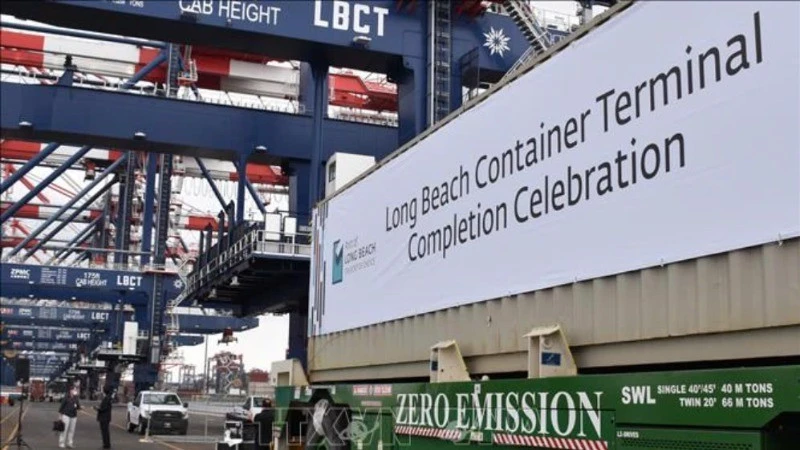EU faces tariff spiral with US
The European Union (EU) has announced that it will postpone the imposition of retaliatory tariffs on US goods until August 1, instead of July 14 as previously announced. The decision was made after US President Donald Trump announced that a 30% import tax will be imposed on goods from the EU from starting from August 2025.
 |
| A view of a cargo port in California, the US. (Photo: Xinhua/VNA) |
European Commission (EC) President Ursula von der Leyen announced that the EU will postpone the imposition of retaliatory tariffs on US goods until August 1, but she noted Brussels will impose tough retaliation if no agreement is reached with Washington.
Italian Prime Minister Giorgia Meloni stressed that Europe has enough economic and financial strength to assert its position and reach a fair and reasonable agreement and supported the EU’s decision to delay its response in the hope of reaching an agreement with the US.
On July 14, the EU Trade Council held an urgent meeting in Brussels, concluding that the new 30% tariff announced by the US was unreasonable and unacceptable. However, the Trade Ministers of EU member states supported continuing dialogue with the US towards reducing tariffs and restoring bilateral trade activities.
In a spirit of constructive goodwill, the council agreed to facilitate diplomatic efforts by extending the suspension of the EU's first package of countermeasures, including additional tariffs on US imports worth 21 billion EUR, until early August.
Although the specific US tariffs on the EU are suspended until August 1, there are some additional tariffs in place, including a basic tariff of 10%, an additional tariff of 50% on steel and aluminium, and an additional tariff of 25% on cars.
According to the EC, these tariffs currently affect about 70% of the total value of EU exports to the US market. On the contrary, with a tough stance, German Vice Chancellor and Finance Minister Lars Klingbeil said that serious negotiations and a specific solution with the US are still necessary, but if they fail, the EU needs to prepare countermeasures to protect Europe.
In the face of the tariff storm threatening to hit Europe, experts analysed that EU member countries have different trade relations with the US, so the new tariffs will have different impacts. Ireland and Germany are expected to be hit hardest, as Dublin has a large pharmaceutical industry, while Berlin exports the majority of its cars, steel, and machinery to the US.
Ireland currently has the largest trade surplus with the US among EU member states, at 86.7 billion USD, largely because major US pharmaceutical companies such as Pfizer, Eli Lilly, and Johnson & Johnson are headquartered in Dublin to take advantage of the 15% corporate tax rate, lower than the 21% rate in the US. These companies register patents in Ireland and sell their products in the US market.
According to Eurostat, pharmaceuticals account for 22.5% of the EU's total exports to the US. Thanks to its attractive tax policy, Ireland is also home to many US technology corporations such as Apple, Google, and Meta.
Germany is under great pressure due to its dependence on the US market. The EU’s largest economy recorded a trade surplus of $84.8 billion with the US, largely thanks to the automotive, chemicals, steel and heavy machinery industries. A small example: the US market currently accounts for 23% of the revenue of German carmaker Mercedes Benz. After Ireland and Germany, France and Italy are the next on the list of countries most affected by the new US tariffs.
US statistics show that these two countries have trade surpluses with the US of 44 billion USD and 16.4 billion USD, respectively. Experts say that a 30% tariff would be disastrous for the French wine and spirits industry, not to mention the aviation and luxury goods sectors.
The aerospace industry accounts for about 20% of France’s exports to the US, mainly from the Airbus Group.
The latest US tariff announcement is shocking traditional trading partners, including the EU. EC President von der Leyen criticised the new US tariffs but affirmed that the EU still wants to cooperate towards a bilateral trade agreement that benefits both sides.
NDO





READER COMMENTS